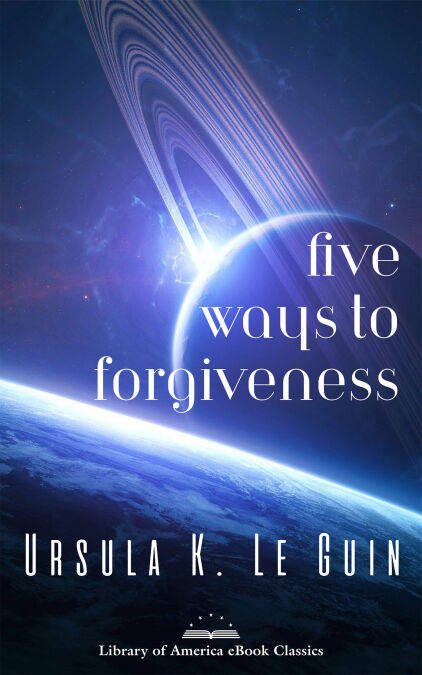
- Afhalen na 1 uur in een winkel met voorraad
- Gratis thuislevering in België vanaf € 30
- Ruim aanbod met 7 miljoen producten
- Afhalen na 1 uur in een winkel met voorraad
- Gratis thuislevering in België vanaf € 30
- Ruim aanbod met 7 miljoen producten
Zoeken
Five Ways to Forgiveness E-BOOK
A Library of America eBook Classic
Ursula K. Le Guin
E-book | Engels
€ 9,85
+ 9 punten
Uitvoering
Omschrijving
Set in the same universe as Le Guin’s The Left Hand of Darkness and The Dispossessed, these five linked Hainish stories follow far-future human colonies living in the distant solar system
Here for the first time is the complete suite of five linked stories from Ursula K. Le Guin’s acclaimed Hainish series, which tells the history of the Ekumen, the galactic confederation of human colonies founded by the planet Hain. First published as Four Ways to Forgiveness, and now joined by a fifth story, Five Ways to Forgiveness focuses on the twin planets Werel and Yeowe—two worlds whose peoples, long known as “owners” and “assets,” together face an uncertain future after civil war and revolution.
In “Betrayals” a retired science teacher must make peace with her new neighbor, a disgraced revolutionary leader. In “Forgiveness Day,” a female official from the Ekumen arrives to survey the situation on Werel and struggles against its rigidly patriarchal culture. Embedded within “A Man of the People,” which describes the coming of age of Havzhiva, an Ekumen ambassador to Yeowe, is Le Guin’s most sustained description of the Ur-planet Hain. “A Woman’s Liberation” is the remarkable narrative of Rakam, born an asset on Werel, who must twice escape from slavery to freedom. Joined to them is “Old Music and the Slave Women,” in which the charismatic Hainish embassy worker, who appears in two of the four original stories, returns for a tale of his own. Of this capstone tale Le Guin has written, “the character called Old Music began to tell me a fifth tale about the latter days of the civil war . . . I’m glad to see it joined to the others at last.”
Here for the first time is the complete suite of five linked stories from Ursula K. Le Guin’s acclaimed Hainish series, which tells the history of the Ekumen, the galactic confederation of human colonies founded by the planet Hain. First published as Four Ways to Forgiveness, and now joined by a fifth story, Five Ways to Forgiveness focuses on the twin planets Werel and Yeowe—two worlds whose peoples, long known as “owners” and “assets,” together face an uncertain future after civil war and revolution.
In “Betrayals” a retired science teacher must make peace with her new neighbor, a disgraced revolutionary leader. In “Forgiveness Day,” a female official from the Ekumen arrives to survey the situation on Werel and struggles against its rigidly patriarchal culture. Embedded within “A Man of the People,” which describes the coming of age of Havzhiva, an Ekumen ambassador to Yeowe, is Le Guin’s most sustained description of the Ur-planet Hain. “A Woman’s Liberation” is the remarkable narrative of Rakam, born an asset on Werel, who must twice escape from slavery to freedom. Joined to them is “Old Music and the Slave Women,” in which the charismatic Hainish embassy worker, who appears in two of the four original stories, returns for a tale of his own. Of this capstone tale Le Guin has written, “the character called Old Music began to tell me a fifth tale about the latter days of the civil war . . . I’m glad to see it joined to the others at last.”
Specificaties
Betrokkenen
- Auteur(s):
- Uitgeverij:
Inhoud
- Aantal bladzijden:
- 267
- Taal:
- Engels
Eigenschappen
- Productcode (EAN):
- 9781598535716
- Verschijningsdatum:
- 4/09/2017
- Uitvoering:
- E-book
- Beveiligd met:
- Adobe DRM
- Formaat:
- ePub

Alleen bij Standaard Boekhandel
+ 9 punten op je klantenkaart van Standaard Boekhandel
Beoordelingen
We publiceren alleen reviews die voldoen aan de voorwaarden voor reviews. Bekijk onze voorwaarden voor reviews.








